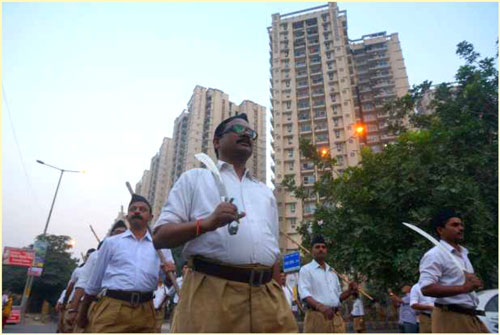THE organisers say they make a distinction, as do most scholars, between Hinduism and Hindutva but this distinction is lost on all those flinging the accu-sation of ‘Hinduphobia’ at the organisers.
This is because Hindutva is – as Jyotirmaya Sharma notes in his eponymous 2003 book – “the dominant ex-pression of Hinduism of our times”, and has been so since well before the advent of the Narendra Modi government.
It should therefore not come as a surprise that those who subscribe to the Hindutva worldview see it not just as the dominant expression of Hinduism of our times but also the only legitimate and permissible expression of Hinduism.
The fact that various babas and godmen and maharaj-jis have embraced this expression of Hinduism adds to the apostasy of those who choose to remain outside the fold or, worse, critique it.
That Hindutva enjoys not just state patronage – which it has, off and on, to a greater or lesser degree, for years if not decades – but also state power provides an added edge of menace to the conference’s critics.
That is the only reason why some Indian scholars abroad have baulked from publicly identifying themselves as organisers of the event and some university departments which were co-sponsoring the conference have decided to cry off.
I know of at least one instance where a senior Washington-based Indian diplomat – acting presumably on instructions from Delhi (whether Raisina Hill or Jhandewalan it is hard to tell) strong-armed an Indian studies centre at an Ivy League university.
Some of the prospective speakers have been trolled and even subjected to rape and death threats.
That a lot of this threat-mongering is happening despite the online conference being a ‘North American’ enterprise suggests those doing the threatening either reside elsewhere or are confident that their patrons in the ‘pitrabhoomi’ can fend off the law enforcement agencies in their adopted motherland.
One of the critics of the event has asked, somewhat disingenuously, why such a conference is “being organised ostensibly in North America rather than India”.
Though he notes that “the event is online and virtual rather than live and in real time”, the answer, surely is obvious.
Had an attempt been made to hold a conference critiquing Hindutva as a physical event in India, none of the foreign scholars due to speak would have been given visas.
Assum-ing the police did not cite a threat to public order as a ruse to cancel the event, no public university would have given space and it is doubtful any pri-vate university would have been brave enough to step in to the breach.
Last year, the external affairs ministry sought to impose restrictions on the par-ticipation of overseas speakers for online seminars too.
At the heart of the question – ‘Why critique Hindutva in the US?’ – is the desire to seek extra-territorial application of the restrictions the Modi government has placed on academic and political discourse.
Not content with policing Indian universities, the Sangh parivar now wants to dictate what can and cant be discussed abroad.
The irony is that in their behaviour, the angry activists have ended up validating all six characteristics that Jyotirmaya Sharma had identified as central to the Hindutva vision or enterprise in his seminal book.The first is to “transform Hinduism into a rigid, codified, monochromatic entity. —KMS




